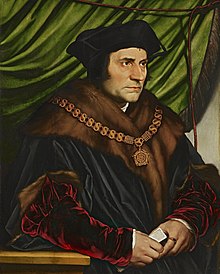
Henry VIII was King of England from 22 April 1509 until his death in 1547. Henry is known for his six marriages and his efforts to have his first marriage annulled. His disagreement with Pope Clement VII about such an annulment led Henry to initiate the English Reformation, separating the Church of England from papal authority. He appointed himself Supreme Head of the Church of England and dissolved convents and monasteries, for which he was excommunicated by the pope.

Sir Thomas More, venerated in the Catholic Church as Saint Thomas More, was an English lawyer, judge, social philosopher, author, statesman, amateur theologian, and noted Renaissance humanist. He also served Henry VIII as Lord High Chancellor of England from October 1529 to May 1532. He wrote Utopia, published in 1516, which describes the political system of an imaginary island state.

Thomas Wolsey was an English statesman and Catholic cardinal. When Henry VIII became King of England in 1509, Wolsey became the king's almoner. Wolsey's affairs prospered and by 1514 he had become the controlling figure in virtually all matters of state. He also held important ecclesiastical appointments. These included the Archbishop of York—the second most important role in the English church—and that of papal legate. His appointment as a cardinal by Pope Leo X in 1515 gave him precedence over all other English clergy.

Anne Boleyn was Queen of England from 1533 to 1536, as the second wife of King Henry VIII. The circumstances of her marriage and execution by beheading for treason, made her a key figure in the political and religious upheaval that marked the start of the English Reformation.
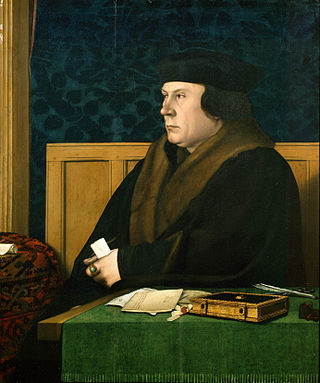
Thomas Cromwell, briefly Earl of Essex, was an English statesman and lawyer who served as chief minister to King Henry VIII from 1534 to 1540, when he was beheaded on orders of the king, who later blamed false charges for the execution.

David Paul Scofield was an English actor. During a six-decade career, Scofield achieved the Triple Crown of Acting, winning an Academy Award, Emmy, and Tony for his work. Scofield established a reputation as one of the greatest Shakespearean performers. He declined the honour of a knighthood, but was appointed CBE in 1956 and became a CH in 2001.
Robert Oxton Bolt was an English playwright and a two-time Oscar-winning screenwriter, known for writing the screenplays for Lawrence of Arabia, Doctor Zhivago, and A Man for All Seasons, the latter two of which won him the Academy Award for Best Adapted Screenplay.

George Boleyn, Viscount Rochford was an English courtier and nobleman who played a prominent role in the politics of the early 1530s as the brother of Anne Boleyn, second wife of King Henry VIII. George was the maternal uncle of Queen Elizabeth I, although he died long before his niece ascended the throne. Following his father's promotion in the peerage in 1529 to Earl of Wiltshire and Earl of Ormond, he adopted his father's junior title Viscount Rochford as a courtesy title. He was accused of incest with his sister Anne during the period of her trial for high treason, as a result of which both were executed.
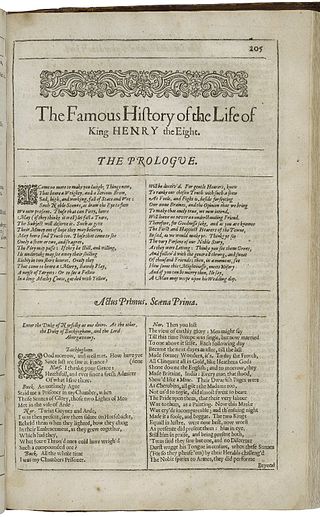
Henry VIII is a collaborative history play, written by William Shakespeare and John Fletcher, based on the life of Henry VIII. An alternative title, All Is True, is recorded in contemporary documents, with the title Henry VIII not appearing until the play's publication in the First Folio of 1623. Stylistic evidence indicates that individual scenes were written by either Shakespeare or his collaborator and successor, John Fletcher. It is also somewhat characteristic of the late romances in its structure. It is noted for having more stage directions than any of Shakespeare's other plays.

William Roper was an English lawyer and member of Parliament. The son of a Kentish gentleman, he married Margaret, daughter of Sir Thomas More. He wrote a highly regarded biography of his father-in-law.

Eustace Chapuys, the son of Louis and Guigonne Dupuys, was a Savoyard diplomat who served Charles V as Imperial ambassador to England from 1529 until 1545 and is best known for his extensive and detailed correspondence.

A Man for All Seasons is a 1966 British historical drama film directed and produced by Fred Zinnemann, adapted by Robert Bolt from his play of the same name. It depicts the final years of Sir Thomas More, the 16th-century Lord Chancellor of England who refused both to sign a letter asking Pope Clement VII to annul Henry VIII of England's marriage to Catherine of Aragon and to take an Oath of Supremacy declaring Henry Supreme Head of the Church of England.
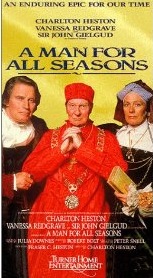
A Man for All Seasons is a 1988 American made-for-television drama film about St. Thomas More, directed by and starring Charlton Heston. It is based on the play of the same name by Robert Bolt, which was previously adapted in the Academy Award winning 1966 film A Man for All Seasons. It was the first made-for-television film produced on behalf of the TNT television network.
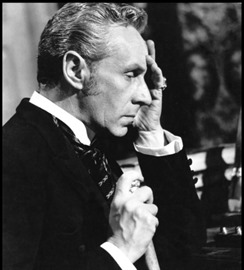
Noel Willman was an Irish actor and theatre director. Born in Derry, Ireland, Willman died aged 70 in New York City, United States.
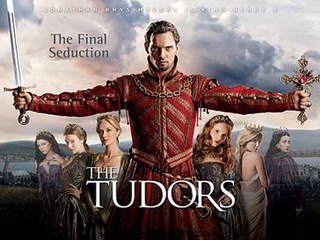
The Tudors is a historical fiction television series set primarily in 16th-century England, created and written by Michael Hirst and produced for the American premium cable television channel Showtime. The series was a collaboration among American, British, and Canadian producers, and was filmed mostly in Ireland. While named after the Tudor dynasty as a whole, it is based specifically upon the reign of King Henry VIII.

Henry VIII is a two-part British television serial produced principally by Granada Television for ITV from 12 to 19 October 2003. It chronicles the life of Henry VIII of England from the disintegration of his first marriage to an aging Spanish princess until his death following a stroke in 1547, by which time he had married for the sixth time. Additional production funding was provided by WGBH Boston, Powercorp and the Australian Broadcasting Corporation.
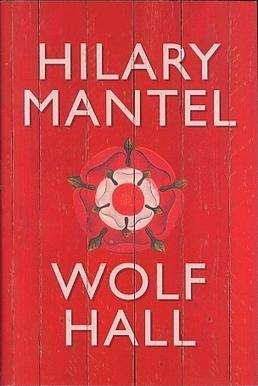
Wolf Hall is a 2009 historical novel by English author Hilary Mantel, published by Fourth Estate, named after the Seymour family's seat of Wolfhall, or Wulfhall, in Wiltshire. Set in the period from 1500 to 1535, Wolf Hall is a sympathetic fictionalised biography documenting the rapid rise to power of Thomas Cromwell in the court of Henry VIII through to the death of Sir Thomas More. The novel won both the Booker Prize and the National Book Critics Circle Award. In 2012, The Observer named it as one of "The 10 best historical novels".
Anne Boleyn is a play on the life of Anne Boleyn by the English author Howard Brenton, which premiered at Shakespeare's Globe in 2010. Anne Boleyn is portrayed as a significant force in the political and religious in-fighting at court and a furtherer of the cause of Protestantism in her enthusiasm for the Tyndale Bible.
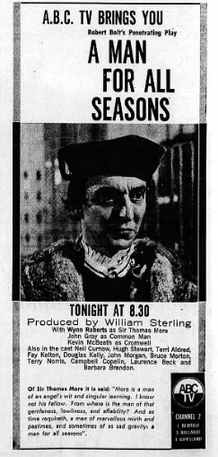
A Man for All Seasons is a 1964 Australian television play. It is an adaptation of the play by Robert Bolt.
Thomas Cromwell was Chief Minister to King Henry VIII of England from 1534 to 1540. He played a prominent role in the important events of Henry's reign, including the king's divorce from Catherine of Aragon, the execution of Anne Boleyn, the marriage to Anne of Cleves, the Dissolution of the monasteries, and the English Reformation. These dramatic events have provided the inspiration for plays, novels and films from shortly after his death until modern times.

